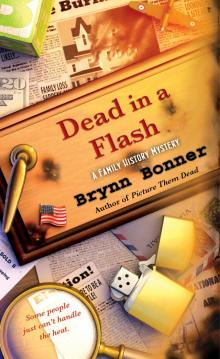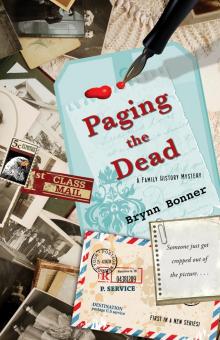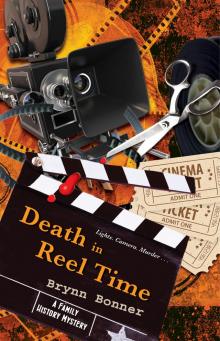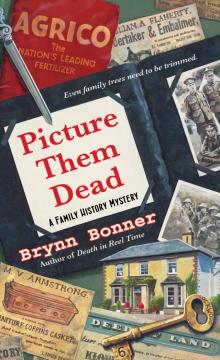- Home
- Brynn Bonner
Dead in a Flash Page 9
Dead in a Flash Read online
Page 9
I glanced over at the family tree I was working on for Conrad. I hadn’t gotten very far with it. “I can go. I’ve got a few questions for Dinah Leigh or Conrad. Maybe one of them will still be there.”
“All of them are, except maybe Judith. She was going home to check on her sick kids. And they’re all planning to return here after the funeral. Apparently some of the treatments at the spa are helping Lily Rose and she’s going to stay for a while.”
“That’s good. And Dinah Leigh is staying, too?”
Esme shrugged. “Moral support, I guess. Maybe she’s doing it for Chelsea. Anyhow, I take it she’s decided to stay as long as the others do.”
“Hoping for some answers before they leave, probably,” I said.
“Aren’t we all,” Esme said with a sigh.
* * *
After Esme left for church, Jack called and asked if he could stop by. “I won’t stay long, I know you’re busy. I’m going kayaking with Mike Bennett but I thought maybe you could use a little pick-me-up.”
“And you thought you’d be it?” I teased. “A little conceited, aren’t we?”
“Well, a guy can hope,” Jack said. “But I meant ginger ale. I got you a six-pack of that stuff you like that burns its way down to the belly. Oh, and a package of Fig Newtons, too.”
“You sweet-talkin’ cowboy, you know me well,” I said.
“I should, I’ve seen you eat a million of those things,” Jack said. “I’ll be by in a few.”
I was arranging my calligraphy supplies when I heard Jack’s customary “hey” from the front hall. It was the same buddy greeting I’d gotten for the past few years, except that when he came into the workroom now, he gave me a lingering kiss to go with it. I heartily approved of the addition. I’ve decided friendship that ripens into romance is the best, most frightening relationship there is. Jack and I knew each other well from our years of being pals. That was good. But we were both nervous about what we had to lose if this didn’t work out. Still, the pledge to take it slow had proven surprisingly hard to keep, on my part anyway.
The high-octane ginger ale, the cookies, and the visit from Jack all served to pep me up, until he told me a choice bit of info he’d picked up that morning.
“A guy from town who works at the boat launch told Mike he’d heard the senator’s grandson and Lincoln talking the afternoon before Lincoln’s murder. Well, not talking exactly, more like taking verbal shots at each other. And Damon said something like ‘You’re done for,’ when he walked off. Anyhow, the guy got to thinking about it after all that happened and called Jennifer to report it. You think the grandson could’ve had anything to do with it?”
“I don’t think there was any love lost between them,” I said. “But I never got the impression Lincoln felt threatened by Damon in the times I saw them together. If anything, he seemed to regard him as sort of a lightweight.”
Jack shrugged. “Probably nothing.”
“Maybe nothing, maybe something,” I said, taking another punishing gulp of the ginger ale.
* * *
I worked steadily for the next hour, but the drawing wasn’t going smoothly because my mind was churning. Lincoln had been a mild-mannered guy. How had he managed to get crossways of so many people?
When Esme came back I told her what Jack had said and she cringed. “I hope to heaven Damon had nothing to do with this bad business,” she said. “That would surely break them all.”
“I know,” I said. “But unfortunately he makes a pretty good suspect.”
“He’s not the only one,” Esme said, going over to her Post-it note array. “You remember you found Chad Deese had some relatives in Quinn County?”
“Yes, pretty distant ones.”
“Well, Great-Uncle Russell spent some time in the hoosegow back in the early fifties for beating up his neighbor over a land boundary dispute.”
“So? Guilt by association?” I asked. “That’s pretty thin.”
“Yes, but guess who his lawyer was,” Esme said. “Alton Sawyer, the senator’s father. And Uncle Russell got the maximum sentence and later claimed he had incompetent defense. Maybe that’s what the family feud was all about.”
Denny’s deep bass voice called from the front hallway. I was still getting used to that. He’d only recently been given the privilege all our other close friends have of “helloing the house” instead of ringing the bell.
Esme got up from the table, wearing a smile that was exclusively for Denny. “Go on into the kitchen,” she called out. “I know you don’t have long. I’ve got your lunch ready.” She curled her finger at me. “You, too. There’s pulled pork in the slow cooker and fresh rolls from the bakery. Come have a sandwich.”
She didn’t need to ask me twice and I followed her in to find Denny slumped at the table.
“You look terrible,” I said, honesty overtaking tact.
“I’m beat,” he said. “Esme, I’m not going to be able to repaint your kitchen anytime soon. We may have to hire it out.”
Esme flapped a hand at him. “You think I’m worried about that at a time like this? It can wait.”
For the past couple of months Esme had been pushing hard to get the house into shape, but as the time came closer for the actual move, she’d become uncharacteristically patient with every delay and had even put up her own impediments. After the kitchen was painted she’d decided she didn’t like the color. That she, in fact, could not live with the color. And she needed more moving boxes but couldn’t seem to find the time to go get them. Clearly she was stalling.
“Any developments?” I asked Denny.
“Nothing much,” he said. “Official ruling was filed. Definitely foul play, which was pretty clear from the evidence of a physical confrontation at the scene. Cooper wasn’t a big guy, so just about anybody could’ve pushed him over that railing. Doesn’t narrow our suspect pool much.”
“Who’s in your suspect pool?” Esme asked, setting his sandwich in front of him.
“Anybody throughout the known world who was alive last Friday night,” Denny said. “Though there are a few we’re looking at with keener interest. Apparently Cooper was loaded for bear for that reporter, Deese.”
“Yes, he was,” Esme said and told him about our encounter with Lincoln that afternoon. “As of late afternoon he hadn’t caught up with him.”
Denton took out his notebook and scribbled a note. “Doesn’t mean he didn’t find him later. We’re checking on the reporter’s whereabouts for our time frame.”
“Which was when, exactly?” I asked, pouring mugs of coffee.
“ME’s sticking with midnight to two a.m.,” Denny said.
I told him more about our conversation with Lincoln about Chad Deese and the admittedly tenuous link Esme had found in his family history.
Denny considered. “People have been known to kill for less.” He made another notation in his book. “Next on my list is Lenora’s son, J.D. Apparently Cooper had some kind of dustup with him, too. I don’t think it amounted to much but we’ll talk to him anyway.”
“What sort of dustup?” I asked.
“I think Cooper inadvertently ruined J.D.’s big reveal about his marriage. Or maybe insulted his wife. J.D. left the new Mrs. Morgan out in the hallway while he went in to prepare his mother. Cooper came upon Gabriela and started questioning her about lurking outside Lenora’s door. J.D. overheard it and took offense at his questions and his tone. Cooper apologized and it seemed like it all blew over quickly, but we’d like to know more. What do you two know about J.D. Morgan?”
“We’d never met him before Saturday,” I said. “His mother talked about him during our interviews. I had the impression he was kind of an absentminded professor type off in the jungle living off dried beetles and coconut milk. But I never got any hint he was a hothead.”
“No, I didn’t get that either,” Denny said, “but I’d still like to talk with him. I’m trying to retrace Cooper’s steps on Friday to construct a timeline. T
here are some pretty big gaps, but I’m slowly filling them in.”
“Did you talk to Jennifer about what Emma told us this morning?” I asked.
Denny nodded again. “Yeah, thanks. Looks like Emma was the last one to see him alive. Other than whoever pushed him over that embankment—assuming it wasn’t Emma.”
“Surely you don’t suspect Emma,” Esme said with a huff. “She’s not a hundred pounds soaking wet and she’s a kid.”
Denny shrugged. “Like I said, he wasn’t a big guy. It wouldn’t have taken much muscle.”
“But you aren’t seriously considering her or Chelsea, are you?” I asked.
“You know my method,” Denny said, “everybody’s a suspect until they’re ruled out. Chelsea was with him, she admits they fought, and nobody saw her when she came back to her room that night. Yes, she’s a suspect. And Emma admits she was there after Chelsea left the scene—again, assuming Chelsea didn’t come back and pick up the fight where they’d left off. So yes, they’re both suspects.”
I wanted to protest, but I couldn’t argue with his logic. It was highly unlikely this was a random crime. Lincoln had known his killer.
“In any case,” Denny said, finishing off the last bite of dill pickle, “there’s one person who’s probably relieved by the ME’s finding, and that’s Cyrus Hamilton. He was sweating bullets. If this had been ruled an accidental fall, he could’ve been held liable. Don’t get me wrong, the man seemed genuinely saddened about Cooper’s death, but he’s a businessman, too, and he’s got a fortune tied up in that hotel. He’s offered free accommodations and services to everyone in the senator’s party for an extended stay.”
“Generous of him,” Esme said. “Though it’s hardly his fault this happened.”
“Not unless he’s the killer,” Denny said, draining his coffee.
“Now you’re being ridiculous,” Esme said.
Denny rose and stretched. “Haven’t ruled him out, so he’s still on my list,” he said, pushing his plate away with an appreciative hum. “And with that, I’d better get back over to the hotel and see if I can knock a few people off this afternoon.” He grimaced and shook his head. “No awful pun intended.”
After we’d cleared away the lunch things and tidied the kitchen, Esme went back to church for choir practice and I went to the hotel to pick up the testimonials from Lenora. I thought of taking pastries or flowers of condolence, but their room had been overrun with both, so I went empty-handed.
I pulled into the visitors’ lot, which was situated at the bottom of a steep incline, and started the hike up to the hotel. Today I found it a pleasure, as it was a perfect North Carolina afternoon. The azaleas were in bloom and created a riot of color around the grounds, the temperature had climbed to around seventy degrees, and there wasn’t a cloud in the blue sky. On a day like today, it seemed impossible anything bad could have happened in this place just two nights ago.
The terrace doors on the lakeside of the hotel were open, creating an indoor/outdoor area adjoining the pool, which meant I didn’t have to hike around to the front entrance. A number of people were sitting about, sipping fresh juices, reading, chatting, or relaxing. Most were dressed in casual chic, making me feel like a fashion don’t, but there was one exception. A man who looked faintly familiar was pacing back and forth at the edge of the terrace. He wore a striped short-sleeved shirt, and a pair of khakis that were a tad too long. As I watched him pace, it reminded me of how Senator Stan had stalked back and forth the day after that article came out. This man had something troublesome on his mind, too. And he moved with the same kind of pent-up tension. He even looked a little like the senator, except for his rumpled dress.
As I started up the steps, the man stopped his pacing and called to me. “Ms. McClure? You’re the genealogist, right?”
“Yes,” I said, more wary than friendly.
He walked over, thrusting out a hand. “I’m Cyrus Hamilton. I wanted to thank you for helping out yesterday after the . . .” He hesitated, searching for a word. “After the tragedy.”
“Esme and I were glad to help,” I said. “We both liked Lincoln Cooper.”
“He was a nice young man,” Hamilton said, nodding pensively. “I know Stan and the rest of them are broken up about this and I feel just terrible that it happened here. Or that it happened at all. When I asked Lenora and Stan to hold the celebration here, I assured them that everything would go smoothly and it most definitely did not.”
“You’re not to blame, Mr. Hamilton,” I said.
“I know that. At least my brain does,” he said, tapping his temple, “but in here it feels different.” He put his hand over his chest. “Just don’t ever tell my lawyer I said that. I’m waiting for him and my insurance guy to show up. They want to see where it happened now that they’ve released the scene. They’re afraid Cooper’s family will sue. And maybe they will. But I knew Samuel Cooper, Lincoln’s daddy, way back and unless he’s changed in the intervening years, I don’t think he’s the kind of man who’d do that.”
“So you’re a Quinn County man?” I asked.
“I didn’t grow up there,” Hamilton said. “But my grandparents lived there and we visited pretty often, so I knew the Sawyers—my dad made sure of that. I stayed part of each summer with my grandparents starting from when I was around ten, so I had the chance to get to know other kids at church or at the ball field or the community doings.”
“Why do you say your dad saw to it that you met the Sawyers?” I asked.
“My dad had worked for Stan’s father as a farm manager when the Sawyers lived out in the country. He wanted to make sure I met them because he admired Alton and Margaret Sawyer so much. After everything that happened with the fire and losing the baby and all, the Sawyers moved into town and my dad was out of a job but Alton helped him out till he could find work. Even with everything Alton had been through and all he had on his mind, he still made sure Dad landed on his feet. Dad never forgot that. And it wasn’t too long till Dad found another opportunity. He moved out to the mountains to run a little hotel my uncle had bought as an investment. I grew up out there.”
“So it’s the family business,” I said.
Hamilton laughed. “I guess it is. That little place was all of eight units. An old-style motor inn where all the doors opened out into the parking lot so you could lift your suitcases straight into your trunk when you opened your door. It had clean rooms and good rates and was situated on a mountainside with a good view. But that’s all it had going for it. It was run-down and ugly as sin when my dad took it over. He didn’t know anything at all about inn keeping, but he figured if he could run a farm, he could run a motel. And he made a big success of it, so much so that by the time I was grown he’d bought six more small hotels and put me in charge of one. And eventually that led to this.” He swept his hand to indicate the seven-story structure. “There now, you didn’t expect my autobiography, but you know you can’t meet a southerner without learning about his people and his story.”
“Considering my profession, you can guess I’m a fan of that southern inclination,” I said. “Is your father still living?”
“He is,” Hamilton said, fiddling with something in his hand. “And living well for his age. My mother passed twenty-odd years ago, but my father’s health is remarkably good for a man in his ninth decade. He travels with me sometimes, though he wasn’t up to coming to the grand opening of this place. He hasn’t seen it yet.”
“I hope he’ll get to soon, it’s spectacular,” I said, but my mind was on other facets of this revelation. The senator had said I was free to talk to anyone about the assignment he and Lenora had given us, so I plunged in. “Mr. Hamilton, do you mind if I ask whether your father was working for the Sawyers when the house burned down?”
“It’s Cyrus, if you please, and yes, he was, though he never liked to talk about it. He was out on the back forty and the house wasn’t in sight, but he saw the smoke and knew what it had to be. He gathere
d up all the farm hands and they ran over, but it was too late.”
“Do you think he’d be willing to talk with me about it?”
“I can’t honestly say. It’s a touchy subject. But I’ll ask him, if you’d like.”
“Thank you, Cyrus,” I said. Using his given name could have felt awkward, but Marydale was right about him being a regular Joe. Or at least he presented himself that way. And if he could get me that interview with his father, I’d call him anything he liked.
We chatted for a few more minutes and Hamilton brightened when I mentioned I was a friend of Marydale’s. “What a woman!” he said. “I’ll tell you the truth, I was leaning toward a place up in Virginia to put this thing”—he gestured again, taking in the complex—“but after spending time with Marydale, I figured if the folks here were anything like her, Morningside was the place.”
As he talked, I kept hearing metallic chinks as he worried something in his hand. He saw me look down and held up a gold Zippo lighter.
“I haven’t seen one of those in years. Now I’ve seen two in the last twenty-four hours,” I said, remembering Yvonne’s beat-up old lighter.
Hamilton smiled. “This was my father’s. It’s a classic. I carry it as a good-luck charm. And I guess I use it as a worry stone when I’m nerved up,” he said, flicking the cover open and closed again. “I don’t even smoke. But back when so many loyal North Carolinians puffed away to support the tobacco farmers, everybody had at least one Zippo in the household.”
I smiled. “You’re right. My father had one and he didn’t smoke either. He kept it in his dresser drawer. It came from his father, who was a pack-a-day man, a habit that unfortunately caught up to him.”
“Ah,” Hamilton said, “like the old proverb says, we grow too soon old and too late wise, eh?”
I followed his gaze and spotted three men coming onto the terrace, each dressed in crisp business suits with ties snugged around starched white collars. Not exactly dressed for their trek along the exercise trail to the overlook.

 Dead in a Flash
Dead in a Flash Paging the Dead
Paging the Dead Death in Reel Time
Death in Reel Time Picture Them Dead
Picture Them Dead